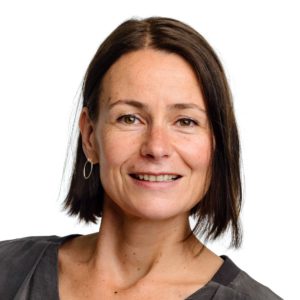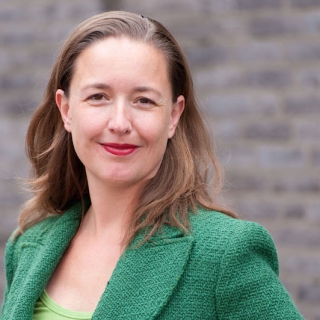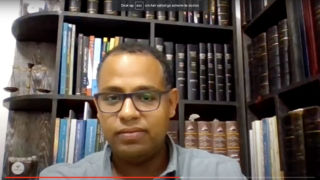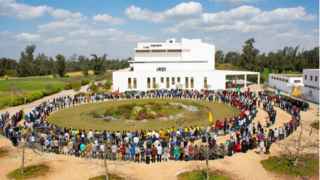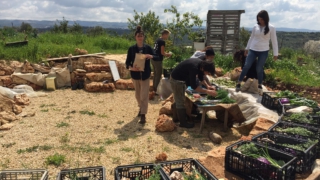Voices from the Green MENA Network – Recommendations to European stakeholders
In June this year, a group of experts and practitioners who work in the fields of energy transition and biodiversity/food sovereignty, got together in the beautiful region of Ajloun, Jordan. They came from Morocco, Algeria, Tunisia, Libya, Egypt, Palestine, Jordan, Lebanon, and Iraq. We got some very concrete recommendations for European stakeholders (policy makers, NGOs and companies) on how they can contribute to a sustainable green agenda that benefits all.
The Green MENA Network
Climate change and environmental challenges are among the most important issues determining the future of the MENA region, and the EU’s relationships with the MENA. Issues like water management, temperatures and pollution are directly related to economic perspectives, livability and power structures. At the same time, there seems to be a gap, a failure among European organisations and institutions to connect to local initiatives and partners in the Middle East. Therefore, we (het Grote Midden Oosten Platform – GMOP) started mapping individuals, organisations, businesses, and initiatives in the MENA-region that are working for a sustainable green environment. Since we started in 2019, the mapping expanded, it now includes more than 650 contacts throughout the Middle East and North Africa. We call it the Green MENA Network.
The Green MENA Network’s goal is to encourage European stakeholders to make aid and trade with the MENA region green, as well as to support local green actors in the region. We believe that these bottom-up actors are a powerful force for a sustainable and green climate agenda, and that they can be valuable partners for Europe as well.
What do we do, and why?
In the past years we expanded the Green MENA Network and identified key players. Building on what we learned during our meetings, interviews, research and online events with green MENA youth, professionals and activists, we noticed that a) small, bottom-up initiatives often do not have the right capacity or funds to learn from colleagues in neighboring countries and b) there is a dramatic absence of meaningful representation from MENA-countries in important global panels and discussions. That is how we identified two priority areas where the network can support:
- Facilitate collaboration and exchange between Green MENA Network actors
- Connect Green MENA Network actors with global/European sustainability discussions and relevant European stakeholders.
From 10th to 13th June 2022, we gathered experts from Morocco, Algeria, Tunisia, Libya, Egypt, Palestine, Jordan, Lebanon, and Iraq who work in the fields of energy transition and biodiversity/food sovereignty. The meeting’s goal was to tap into collective wisdom and to brainstorm about strategies for better MENA representation in global sustainability discussions.
The Green MENA Network has the potential to contribute to truly sustainable development in the MENA region, by taking actions that are good for both planet and people, based on independent and autonomous decision making (rather than on international donor-driven agendas). The network can help to improve representation from the MENA-region in global discussions about climate change and environment protection. Creativity and innovation are also important characteristics within the network.
The production and sharing of indigenous knowledge and innovation in the field of biodiversity and food sovereignty will be taken up within the network too. A basis for such sharing can be found in the Lebanese platform Regenerate Hub (www.regeneratehub.org). And lastly, the network is interested in developing renewable energy hubs in the MENA-region.
Green in the MENA-context
Decolonisation of the food and biodiversity sectors
For local actors in the MENA region, green is more than climate action or sustainability. Many of them associate a sustainable future with decolonization of the agricultural sector and reclaiming of food sovereignty. They want a just transition. Farmers often do not have free access to seeds, to water or land. The most obvious case is Palestine, where land and soil are intertwined with colonization. While Israel is presenting itself as a proponent of sustainability and fighting climate action, it is in fact colonizing the land of 5.2 million indigenous inhabitants of occupied land, it controls water and land use, dumps waste and regularly destroys farmland, water wells and orchards, leaving Palestinians completely dependent on import (which is also controlled by Israel).
Another example of colonial conditions related to land is the way France has banned Total and other companies from fracking on its own territory but is still pushing for it in its former colonies. In 2014-2015, in the heart of the Algerian Sahara, a collective movement protested shale gas exploration by the French oil company Total. The campaign claimed that Algerian citizens were confronting not only the environmental and health hazards of fracking but also this form of neo-colonialism.
In different ways, this lack of sovereignty is present throughout the region in the form of commodity agriculture, seed- and fertilizer monopolies, and the commercialisation of water resources.
Energy transition towards renewables
The energy transition is a huge topic in the MENA-countries, both in oil-producing countries and in the countries without fossil resources. In countries like Egypt and Morocco, governments are investing heavily in renewable energy projects. EU-states are viewing the North African countries as potential suppliers of renewable energy. According to local actors, EU-MENA cooperation projects on energy transition presently do not focus on the benefits of the MENA, but rather on the needs of the EU. They also consider companies in the energy sector as obstructing the transition to renewable energy.
MENA-countries are mostly governed and structured in a centralized manner. When it comes to transitioning to renewable energy, decentralisation of the energy infrastructure could, according to local actors, support the transition as well as make it more sustainable to manage.
Empowerment in global decision making and equality in international relations
Local actors from MENA-countries, like farmer organisations, energy experts or local NGOs, are underrepresented in global platforms, forums and movements where climate change, biodiversity and energy transition are discussed. Consequently, their perspectives, needs and knowledge are not sufficiently included in global or regional strategies and agendas. This absence is caused by a lack of interest from their own governments to include them in national delegations, but also by a lack of funding for travelling and difficulty in obtaining visas.
Many MENA-actors do not even relate to existing global forums, as they consider them dominated by Western agendas, rules and regulations. They see that non-Western countries are treated with different standards, and that Western companies and governments do not apply environmental laws when operating in the MENA.
Recommendations to European stakeholders and people working in the fields of energy transition and biodiversity/food sovereignty
As the party that initiated the Green MENA Network, and as a European foundation, we present recommendations by the Green MENA Network to European stakeholders. The recommendations can be incorporated in European policies and strategies and in cooperation projects with EU-partners and partners from the MENA region.
How can European stakeholders support the Green MENA key players in their efforts?
Policy makers in the EU:
- Help strengthen capacities at MENA Ministries of Environment, as these are currently not considered strong partners for local actors.
- Provide funding for training and expertise (decentralised) for local actors, in fields of energy transition, biodiversity and agroecology, for awareness raising among population, for local staff.
- Invest in research and projects that put communities at the core of solutions.
- Provide visas for local actors so they can attend global forums.
- Enforce European law and environmental regulations on European companies also when they are active outside Europe.
European NGOs:
- Support bottom-up actors to influence their governments and become more powerful players in the transition processes.
- Provide funding for training and expertise (decentralised) for local actors, in the fields of energy transition, biodiversity and agroecology, for awareness raising among population, for local staff.
- Provide funding for development of networks, including funding to sustain these, for workshops and dialogue, and long-term planning in order to become effective platforms for change.
- Help connect MENA-networks with other global South based networks and alliances.
- Ensure to include GCC actors in regional networks, even though they are not coming from traditional development countries.
- Connect your agendas to the agendas of local partners instead of the other way around.
European companies:
- Build relations with local and regional networks, based on ethical values.
- Support the transition towards sustainable food sovereignty/biodiversity, for example by moving away from monocultures and commodity approaches.
- Help decentralise the food production systems, allowing self-sufficiency for farmers, bringing power back to people.
- Help decentralisation of the energy grid to local communities as an important part of a sustainable transition to renewable energy. Invest in local production of renewable energy.
- Avoid land- and water confiscation in the MENA-region, especially in water-stressed regions and when it is used for production for foreign markets.
Het Grote Midden Oosten Platform can advise and support European stakeholders who are preparing or implementing projects in MENA-countries. Contact us via info@hetgrotemiddenoostenplatform.nl.
If you are interested in a constructive collaboration between the EU countries and the MENA countries, we recommend the White Paper we published in November 2021, on the European Green Deal and how it can contribute to a green agenda for MENA countries.
Share this post via
